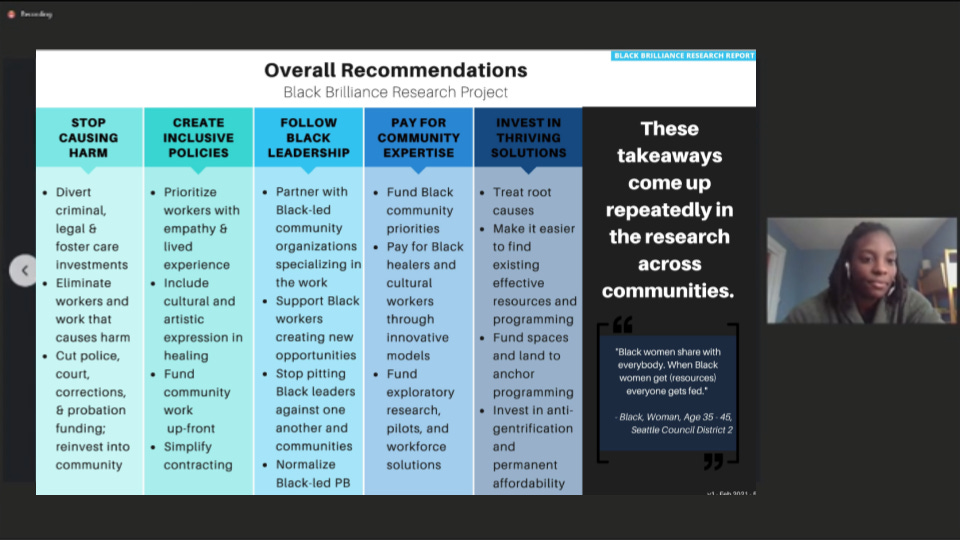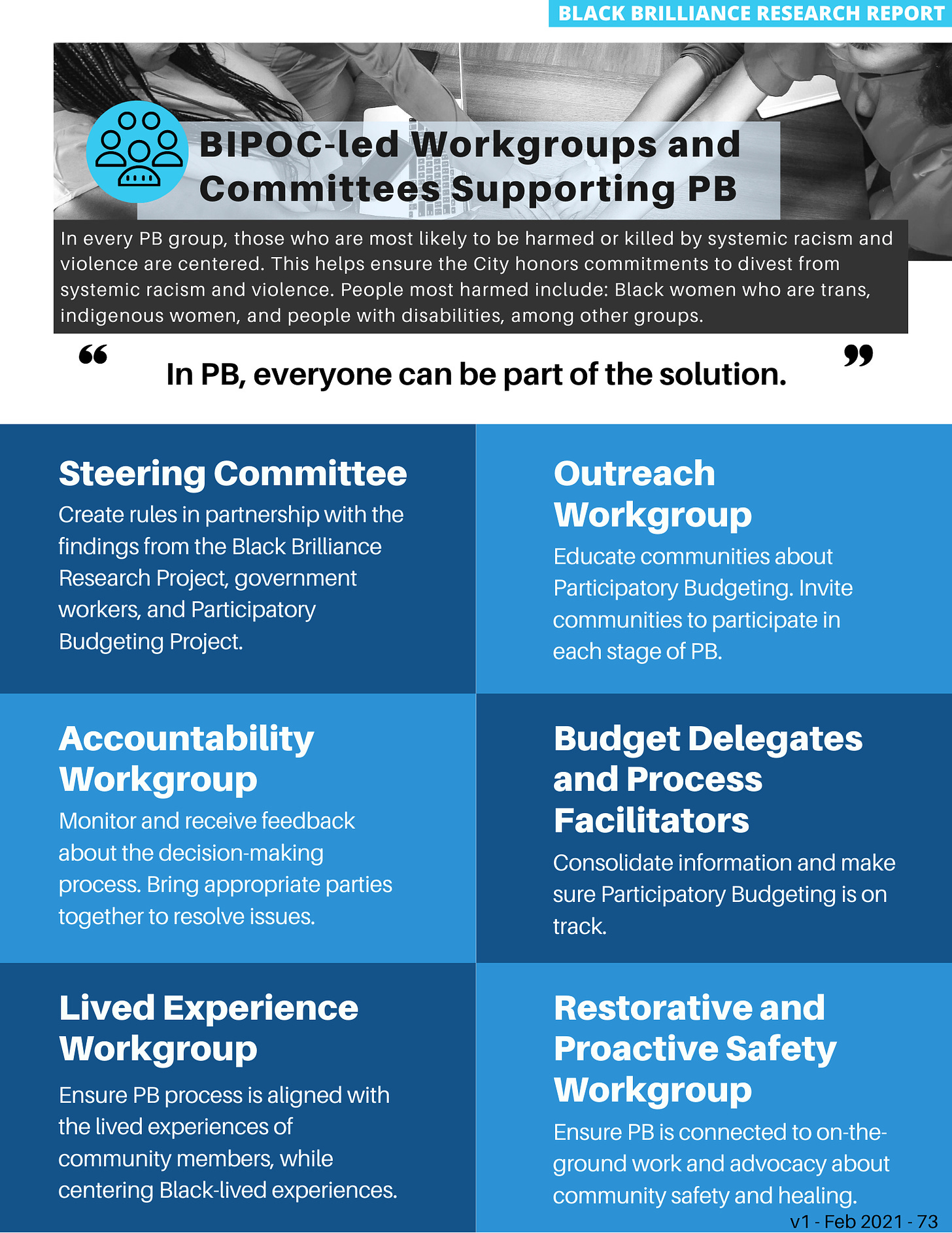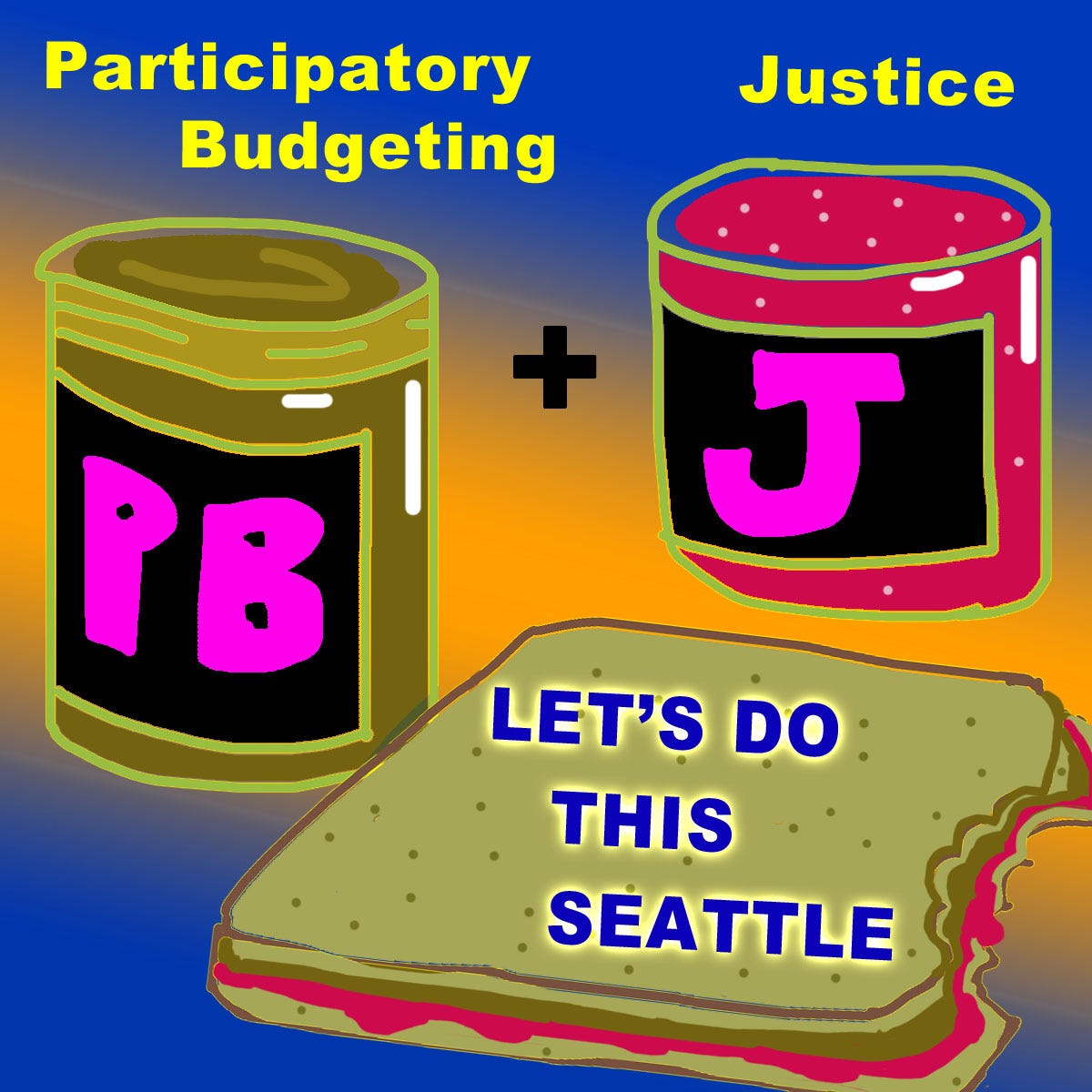Issue 4: Defend the Defund
Our mission is to support each other and collaborate towards the abolition of policing and incarceration in our community. Read the rest of our organizing principles here.
We Intend to Provide
Space for collective action among people who are already involved or want to be involved in abolition work.
Structure to share useful information, educate ourselves, and hold ourselves accountable.
A jumping-off point to support the work of BIPOC researchers and creators through (among other initiatives) BBR, PB, and Defend the Defund.
Black Brilliance Research (BBR) and Participatory Budgeting (PB)
BBR Presentation to City Council
Black Brilliance Research co-leads Shaun Glaze and LéTania Severe presented the BBR findings to Seattle City Council Community Economic Development Committee on Friday, Feb 26. You can watch the full video on the Seattle Channel HERE (start at 1:14:45).

The main takeaways from the presentation were:
Without the tens of thousands of people protesting and marching in the streets, this research would not have happened.
The purpose of the research is to develop a plan for community wellbeing that is rooted in the experiences of Black and brown folks who are most harmed by police violence.
The plan is to utilize participatory budgeting (PB), a democratic system for funding projects, to decide where our public resources go.
Investment priorities for PB projects are:
Housing & Physical Space
Mental Health
Youth & Children
Economic Development
Crises & Wellness
“Most people are not interested in continuing to invest in policing. They're interested in learning how to keep each other safe without police coercion or the threat of systemic violence or oppression.” -LéTania Severe
The slides that were presented to Council are HERE (pdf). The full report is HERE (1292-pg pdf).
-Peter (he/him)
Response from council members
Before and after the BBR presentation, council members made the following comments:
“We're here today to listen to what community is asking for, namely, a shift in how they access resources and decision-making power.” -CM Morales
“Government at all levels needs to do a much better job of engaging and empowering those impacted by how we allocate tax dollars and make policy decisions. This is especially important for those who have been negatively impacted by those government decisions again and again, and the historical harms have to be corrected. And there's wisdom in the communities with lived experience for those solutions.” -CM Pedersen
“In all of these conversations, community is telling us the same thing, and that is: let communities implement their own strategies.” -CM Morales
Participatory Budgeting (PB) Toolkit
The BBR team has highlighted PB-specific information from the 1000+ page report in the following 14-page toolkit: [link to read-only version]; [link to editable version (Canva template)].
Community’s role in PB
The PB steering committee and PB workgroups are described in the above toolkit and in the BBR report, starting on pg. 72.
“Given the scope of community-led PB, we anticipate about 5 full-time paid community workers would serve on each of these workgroups, except the 7-person steering committee. Volunteers may help support each workgroup.” -BBR report
“The steering committee and accountability workgroup will be the first two workgroups hired to start PB. Community may start idea collection phase while the steering committee onboard into their role.” -BBR report
Community support for PB
Public comments
Many community members expressed their support for PB at the beginning of the 2/26 council meeting:
“How do we build a public health and public safety system that works for the most impacted people, Black and indigenous peoples, queer and trans peoples, low income communities? This is an opportunity for us to set those priorities and ensure that money, resources, support and policy shifts reach the things that we most need to see.” - Nikkita Oliver
“As someone who has lived and grew up in Seattle, I take pride in making sure that our community’s voices are heard. Because let’s face it we are often an afterthought and voiceless as a community when it comes to those in positions of power and elected officials. I’m looking forward to the participatory budgeting process and that being equitable to our community as it moves forward.” -Ahmed Hussein
Artwork creation
Matt, Renee, Sharon, Ray, and Peter hosted a PB artwork brainstorming and creation session on Thursday, March 4. For those who missed it, you can still contribute. The meeting produced a collage of stories, images, and words that Participatory Budgeting brings to mind, which can be found HERE. We have also put together a collection of PB graphics from around the world to help generate ideas. We hope that those who feel inspired to create sharable artwork based on this brainstorming session will do so in the coming weeks. Drop your creations HERE (Google drive folder). If you’re creating on Canva, please drop those creations HERE. Please use accessible color combinations. Share on your socials, too! Use #SeattleParticipatoryBudgeting.
You are invited to gather with us again on March 18, from 7 to 8pm. We will share what was created and determine our next steps to support Seattle participatory budgeting as creators. All are welcome, even if you did not attend the first session. Google Calendar link is here.
The City’s role in PB
The $30M of PB funding has not yet been released by City Council.
“The next step for us will be to lift the proviso for this funding. My next committee meeting is March 16. So we are working now to get the implementation plan, the spending plan finalized so that we can draft that ordinance and get that done at the next committee meeting.” -CM Morales
The BBR report (pg 69) stipulates the role of city workers in PB:
Follow Community: Uplift PB priorities from the Black Brilliance Research Project. Defer to community strategic advisors, community facilitators, and community stewards of the PB process.
Provide Support: Grant administrators help transfer money into community control smoothly and quickly. Technical workers provide technical and admin support for PB groups. Staff ensure no education requirements in hiring.
Act with Urgency: Timelines should match the urgency of BIPOC community, centering Black and Indigenous priorities. Lived experience, data collection, and analyses by community members should anchor this work.
Share Records: City and private investment records are shared with the community to help with visualizing racial equity. This informs the development and scoping of PB projects. Share anonymized data regarding staff and consultant diversity and pay equity.
Align City Work: Interdepartmental teams work together to support the division(s) that are stewarding this work. Reduce bureaucracy and eliminate racial disparities.
Share Public Channels: Use departmental and public resources to amplify the messages from community, including the Seattle channel, websites, and other City-owned channels.
“Community’s voice must lead the way.” -BBR report
What about the mayor’s task force?
“I don't know if at the end we will have one pot of participatory budget money or how these processes [PB and the equitable communities Task Force] will intersect. But we're definitely talking about making sure that we are reaching towards the same goal so that we're not working at cross purposes.” -CM Morales
Defend the Defund
On March 9th (today), the City Council’s Public Safety & Human Services Committee discusses Council Bill 119981, which would transfer $5.4 million from the Seattle Police Department’s 2021 budget to the participatory budgeting process. Last year, SPD spent $27 million on overtime despite having a budget of $21 million. They then asked Council to provide $5.4 million in additional funding for three other items that they should have been able to pay for out of their original budget. Council granted this funding, but pledged to reduce SPD’s 2021 budget to offset the overrun.
However, now that we’re in 2021, Councilmember Herbold (who chairs the Public Safety Committee) has wavered on this commitment, saying: “I'm not planning to be rigid on this bill. I’m willing to consider SPD’s recommendations for a number other than $5.4M to reduce.”
The Defend the Defund team, in collaboration with Seattle DSA’s Divest SPD campaign, organized an email, social media, and public comment campaign to urge City Council to honor its commitments, hold SPD accountable, and transfer the full $5.4M to participatory budgeting.
Updates on this morning’s meeting to follow in the next newsletter!
You can read a summary of CB 119981 HERE.
And check out the email, social media, and public comment materials HERE.
-Alice (she/her)
Direct support
The Duwamish Tribe are seeking reinstatement of their federal recognition. The Duwamish people have been fighting to hold the federal government accountable to their treaty promises since it was signed in 1855.
“Generations of Seattleites continue to benefit from the Duwamish People's presence and stewardship of this land—we could not call this city home without the Duwamish Tribe.” -realrentduwamish.org.
As inhabitants of Duwamish land, we can show our solidarity by signing the petition. Learn more by reading their fact sheet.
There is a mutual aid event on Wednesday, March 10th from 3:30-6pm outside of the Station Coffeehouse in Beacon Hill (1600 S Roberto Maestas Festival St.). Items requested include sleeping bags, tents and tarps, new socks and underwear, wound care supplies, narcan, menstrual and personal hygiene supplies, Black hair and skin products, water, and grocery cards. Come out and bring supplies if you can!
Education
We are starting a SAS book club! The first book we will be reading is We Do This ‘Til We Free Us by abolitionist, organizer and educator Mariame Kaba. You can order it from Haymarket Books, from the library, or check with the group as someone may have an extra copy. We plan to meet on April 8th from 6-7:30pm.
-Renee (she/her)
Upcoming
LéTania Severe will be a panelist at an MLK Labor Council meeting on March 17. The focus of the panel is policing and racism, and it will be followed by breakout room dialogues. The goal is to spread political education to help get labor ready to support the movement through their elections and endorsement processes.
We are looking for community members to facilitate breakout room discussions. Volunteers will be paired with MLK Labor board members. I did this last month and it was a great opportunity to meet some new people.
If you are interested, please indicate your availability by filling out this form HERE. There will be a brief facilitator training at 5 pm. The event will start at 6. Group discussion is from 6:30-7.
-Peter (he/him)
I will be hosting office hours for volunteers to drop in, ask questions, and maybe talk about our mission and core principles. Come join us from noon to 12:30pm on Sunday, March 14. Zoom link here.
-Peter (he/him)
Join us
You can contribute to this newsletter or take part in efforts similar to those highlighted here by reaching out to any of us. Or read our organizing principles and join the S.A.S google group here.






